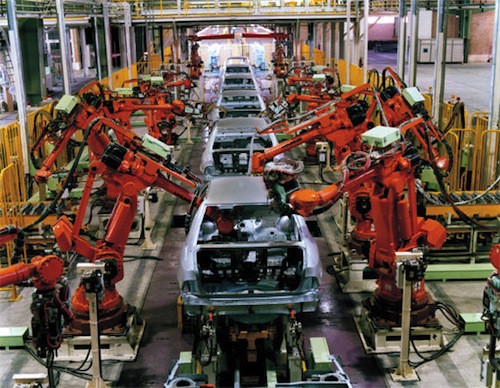In the roboticized, automated and artificially intelligent future that the world faces, Third World nations will have even fewer possibilities for coping than more advanced countries. Africa, for example, now offers cheap labor for manufacturing, and the Economist called the continent An awakening giant in 2014.
However, Africa’s industrial boomlet may be cut short by cheaper automation in the United States:
US robots could increase migration of unemployed Africans, experts say, Yahoo Finance, January 25, 2019
Automation in US factories could increase global migration by wiping out employment opportunities in Africa, according to a development industry expert.
Sara Pantuliano, acting executive director of the Overseas Development Institute (ODI), told the Davos summit that unemployed Africans would be more likely to leave the continent if local manufacturing jobs dried up in the face of renewed US competition.
She highlighted recent ODI research which suggested operating robots in US factories could become cheaper than hiring Kenyan workers by 2033.
The cost of creating and using robots is expected to fall in wealthier countries, and could reach a tipping point where it becomes more efficient than using cheap labour in poorer countries.
On some manufacturing floors, human workers can be hard to find.

Potentially, the mass migrations of Africans to Europe in recent years might be dwarfed by future relocations if job opportunities dramatically shrink because of smart machines. Plus, a United Nations projection says the African population will reach 2.5 billion by 2050, one-quarter of humans on earth.
Of course, Africa won’t be the only underdeveloped region to be hit by automation; they will all be affected. In fact, it’s hard to imagine anything other than severe social disruption arising from areas where severe job loss occurs.
Author Martin Ford had a similar warning:
Why Developing Countries Will Be Left Behind By Automation, By Martin Ford, ThriveGlobal.com, January 23, 2019
Two problems developing countries face in an AI future
Artificial Intelligence is likely to make a dramatic impact on developing countries that rely on lower wages to generate a competitive advantage. This will include countries that provide low cost offshore manufacturing as well as countries like India, which are more focused on service offshoring.
I delved deeply into the global impact on work in my 2015 book Rise of the Robots: Technology and the threat of a Jobless Future. I also discussed it in my new book, Architects of Intelligence, especially in the conversation with James Manyika, who is the chairman of the McKinsey Global Institute, which conducts important research in this area.
There are two problems developing countries face in an AI future:
1. Much of the work available in developing countries is relatively unskilled and routine, repetitive and predictable in nature. Work of this type is destined to be automated. This will be true in both developed and developing countries, but some economists believe the impact could be especially hard on poorer nations because a greater fraction of their workforce is engaged in work of this type.
2. The traditional path to economic development has been to build factories which employ large numbers of unskilled workers. As AI and robotics advance there will be less and less need for such labor-intensive factories (or for service offshoring) of this kind. Much of this production will end up being “reshored” to developed countries where it will be produced using highly automated facilities.
As this traditional path to economic growth begins to evaporate, this will pose a real challenge. In fact economists have already identified what they call “premature deindustrialization” in many developing countries — in other words, companies are replacing their factory workers with automation before they have the means to do so.













